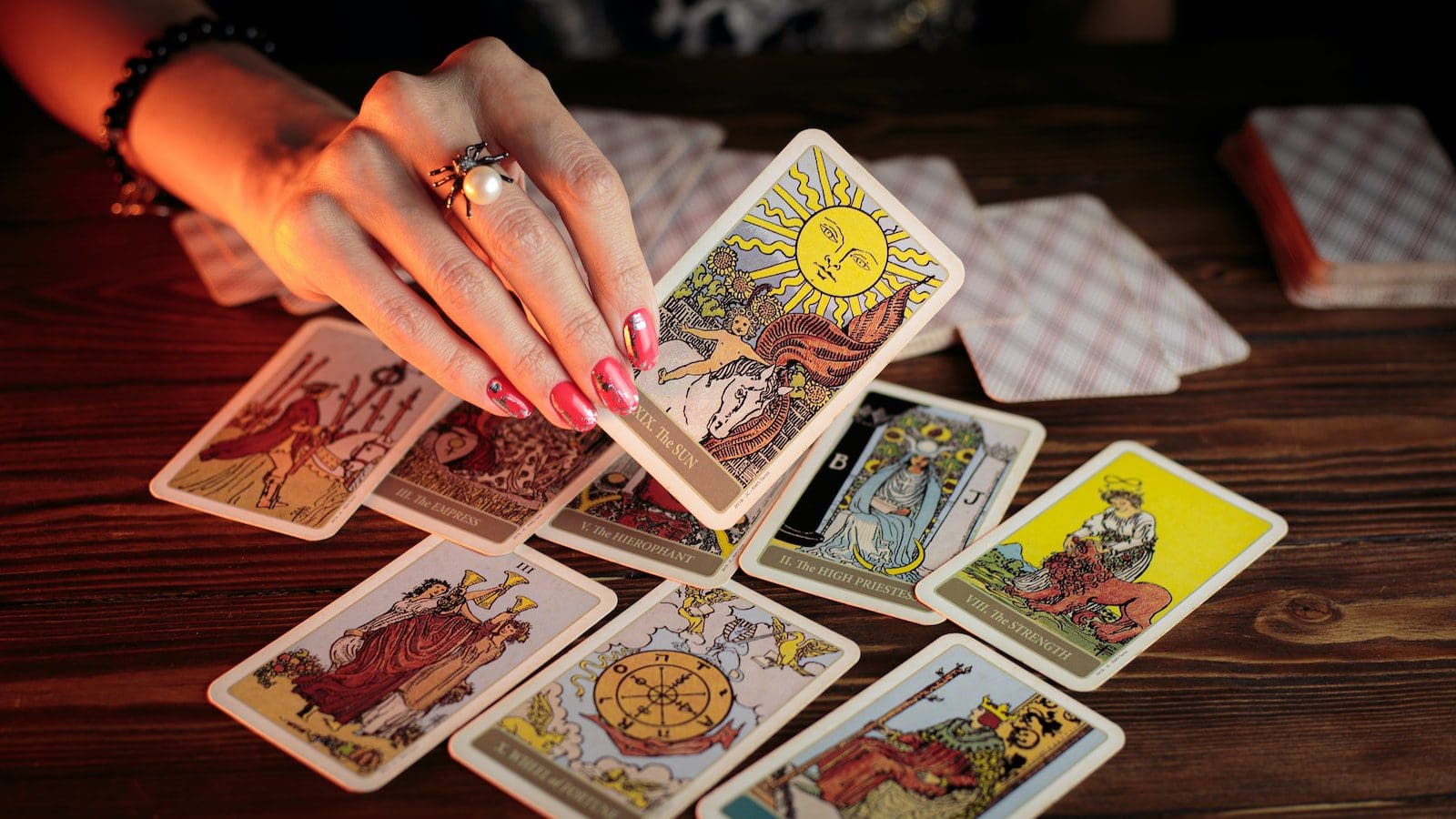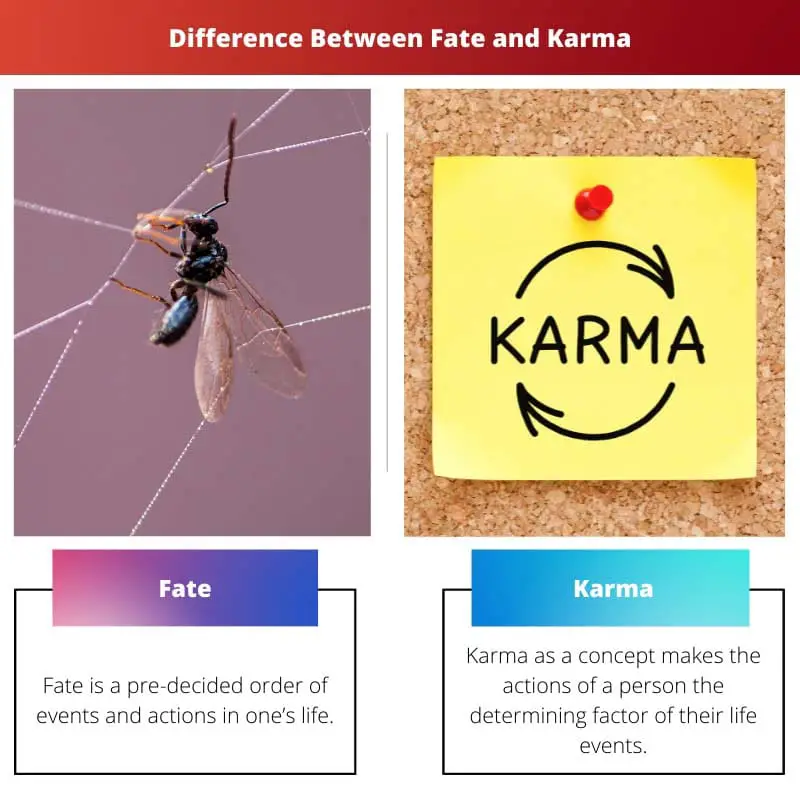Since time immemorial, people have believed in the power of astrology, religion, and the existence of a pre-defined path that governs all the moments of their lives.
In almost all the belief systems of the world, Fate and Karma are two invaluably important concepts. The two terms can be confused with one another, but in truth, these are two slightly different ideas.
Key Takeaways
- Fate is a predetermined course of events believed to be controlled by a supernatural power.
- Karma is a concept in Hinduism, Buddhism, and Jainism, suggesting that actions in one’s life affect future outcomes.
- Fate is considered inescapable, whereas one’s choices and actions can influence karma.
Fate vs Karma
Fate is the occurrence of an event that is out of the person’s control. It is predetermined which means there are no choices in life. Karma is the concept of the consequences of an action, work, or deed. It means our choices in life determine the events of our life. Good deeds bring good karma and vice versa.

Fate is another term for destiny. It is something that has already been decided and is bound to happen. No force of nature or law can change one’s fate. It can be understood as a pre-determined timeline of life that cannot be altered.
Karma, on the other hand, means that one’s future or present is a result of their actions. This in simple terms, means that if one does good work, they are rewarded, but if their actions or “karma” are evil, then the result too will be detrimental. This entire concept is summed up as Karma.
Comparison Table
| Parameters of Comparison | Fate | Karma |
|---|---|---|
| Definition | Fate is a pre-decided order of events and actions in one’s life. | Karma as a concept makes the actions of a person the determining factor of their life events. |
| Determining Factor | Fate is based on the will of the Almighty. | One’s actions and work are the determining factors in the philosophy of Karma. |
| Authority | A person has no authority over his or her fate. It remains unchanged. | A person has control over his or her Karma. It is an individual’s actions that shape karma. |
| Choice | One does not have a choice or an option of altering their fate. | Karma is based on the choices a person makes in his or her journey of life. |
| Origin | The philosophy of Fate is said to be originated from ancient Greek and Roman times. | The philosophy of Karma has its roots in the soil of the Indian subcontinent. |
What is Fate?
Fate is the concept that is understood as a pre-determined set of events that are bound to happen in an individual’s life. It is something that is unchangeable and cannot be, under any circumstance, avoided. It is not possible for an individual to alter it using any or every possible means.
It connotes that an individual’s life, from the moment they take their first breath of air until the moment they release their last breath, has been scripted by the divine forces. Every moment of a person’s life is decided beforehand according to the concept of Fate.
It is widely believed that the philosophy of fate came from Ancient Greeks and Romans. There were Greek and Roman Goddesses known as ‘Fate Spinners’, who weaved the threads of the fate of a person’s life. Fate is understood to be directed upon the Almighty’s wishes.
The concept of Fate has been accepted by multiple religions. The Gods or deities responsible for the creation of one’s fate differ in different religions. For instance, within Christianity, fate is decided by God or Jesus.
Within Greek mythology, the Moirai goddesses were the fate spinners, and so on. The people who believe in the philosophy of fate are called Fatalists.

What is Karma?
Karma is a concept that revolves around one’s actions. The basic explanation is that if one does good deeds, they get rewarded for it, and if they do deeds that are insincere in nature, then they repay for it in a similar manner. The proverb, “You reap what you sow,” perfectly explains Karma.
Unlike Fate, Karma gives control to the individual. It is based on the individual’s choices and decisions that Karma is shaped. This is why the basis of Karma is rooted in the cause-and-effect relationship. Karma is not pre-determined; it can be changed depending on the actions of an individual.
When one does good work or partakes in deeds that are beneficial for mankind, they are rewarded with good karma. This means that the person will lead a nicer life and may have a comfortable next life.
Contrarily when one indulges in bad activities, they receive bad karma, which means their future life will be affected negatively.
The philosophy of Karma is known to have evolved from the Indian subcontinent. The concept of Karma was embedded in the notion of rebirth in several sects of India.
Today, the idea of Karma has spread far and wide. It has now become a popular belief that one’s future is shaped based on one’s deeds and actions.

Main Differences Between Fate and Karma
- Fate is something that has been ordained by the divine powers, whereas Karma is based on human agency.
- Fate is known to be pre-defined and fixed even before an individual’s birth, but Karma works depending upon the individual’s actions.
- Fate is unavoidable and cannot be changed in any manner, but Karma can be altered based on one’s activities.
- A person does not have any authority over his or her fate, but on the other hand, Karma is controlled by the choices a person makes.
- While Fate has its origin embedded in Ancient Greek and Roman mythology, Karma is known to have emerged from ancient Indian beliefs.

- https://www.jstor.org/stable/25614519
- https://books.google.com/books?hl=en&lr=&id=QSrzLfyHvxYC&oi=fnd&pg=PP13&dq=Fate+and+Karma&ots=BFnYKLQd3v&sig=QWUmI9uw8-YvQmTRP1dcoZw_DOs

The proverb ‘You reap what you sow’ perfectly encapsulates the essence of karma. It’s interesting to see how the concept of karma relies on an individual’s choices and their impact.
The role of Greek and Roman mythology in the philosophy of fate is quite intriguing. The idea of ‘Fate Spinners’ weaving the threads of a person’s life is captivating.
The explanation of how good deeds result in good karma, and negative actions lead to detrimental outcomes, makes the concept of karma effectively understandable.
The connotations of fate being directed by divine forces in various religions provide an interesting insight into cultural beliefs and their influence on the concept of fate.
The roots of the concept of karma in the Indian subcontinent and its influence on Hinduism, Buddhism, and Jainism showcase the deep cultural significance of this philosophy.
The concept of karma, on the other hand, emphasizes individual actions and control. It’s intriguing to see how the cause-and-effect relationship plays a role in shaping one’s karma.
The cause-and-effect relationship at the core of karma makes it a unique and thought-provoking concept. It’s intriguing to see how an individual’s actions can shape their karma.
The idea of fate being unchangeable and predetermined by divine forces is a common theme in many religions and mythologies. It’s interesting to see how this concept has been accepted in various cultural beliefs.
I’ve always been fascinated by the ideas of fate and karma, it’s interesting to learn the differences between them and how they are perceived in various belief systems.
The comparison table provided is a good way to highlight the distinctions between fate and karma. It’s clear that the two concepts have their own unique philosophies and origins.